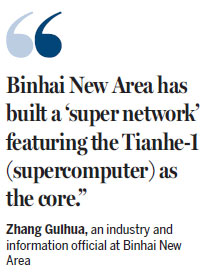
Fourth industrial revolution becoming a reality in region
At a high-level meeting in May 2016, a senior official said of the country's industrial business model: "China is already a big manufacturing nation, but far from a manufacturing power ... Integration of manufacturing and the internet is an inevitable path of modern industry."
Tianjin is embracing its role in that industrial upgrading as the national center for advanced manufacturing research and as the intelligent manufacturing center of the Beijing-Tianjin-Hebei region.
Tianjin has a long history in manufacturing - it is often called "the birthplace of modern Chinese industry".
The city is the largest port in northern China, the center of China's chemicals and aviation industries, and has the world's largest cluster of bicycle manufacturers. Now, its economy is roughly balanced between services and high-end manufacturing.
But manufacturing is changing around the world because of the robots, sensors
and other technologies that are leading to what the World Economic Forum calls
the fourth industrial revolution.
So, Tianjin is making big investments to ensure that its companies are leaders in the coming era of advanced manufacturing.
Earlier this year, for example, the city government announced that it is establishing a 100 billion yuan ($14.6 billion) fund-of-funds to invest in artificial intelligence companies in Tianjin, focusing on smart robots, smart hardware and software, smart sensors, virtual and augmented reality and internet-connected cars. In short, the investment fund targets the intersection between AI and manufacturing.
Also, Tianjin Binhai New Area announced last year that it will establish a 30 billion yuan fund with China Traffic Construction Group.
That fund, as China Daily earlier reported, will primarily be used to facilitate cooperation among global intelligent engineering technology centers and Binhai's Sino-German Industry 4.0 intelligent manufacturing center, its integrated circuit center, automotive electronics and automated driving center, and its intelligent transportation center. It will also concentrate on applying the internet of things to create smart city systems.
The city has also set up a 10 billion yuan fund to reward companies that purchase industrial robots or other advanced manufacturing equipment.
The city also seeks to attract top scientists. For example, China Money Network recently reported that it will award as much as 10 million yuan to Nobel Prize winners who come to work there.
Tianjin Binhai New area expects the size of its intelligent industry to reach 50 billion yuan in revenue by 2020.
The National Supercomputing Tianjin Center, located in Binhai New Area, houses China's first petaflops speed supercomputer.
"Binhai New Area has built a 'super network' featuring the Tianhe-1 (supercomputer) as the core, so that 50 companies can enjoy 24-hour supercomputing services," Zhang Guihua, deputy director of the district commission of industry and information in Binhai New Area, told China Economic and Financial News in 2017, adding "'Tianjin Binhai Industrial Cloud Platform' has served more than 100 enterprise users."
The city has set up a free trade zone including Binhai New Area, the airport and the port. It has also set up the Tianjin Economic Development Area, which is attracting international hotels and businesses.
Tianjin has also established the annual World Intelligence Conference, which had more than 4,000 attendees in May of this year. It brings together international scientists and business leaders in the fields of artificial intelligence, robotics, sensors, finance and smart cities.
In his opening speech to the WIC, Li Hongzhong, secretary of the Tianjin Municipal Committee of the Communist Party of China, said: "As we build the national base for advanced manufacturing, the core area of North China for international shipping, the pilot area for financial innovation and operation, as well as the pioneering area for reform and opening-up, Tianjin has enormous untapped potential in intelligence technologies and the digital economy."

